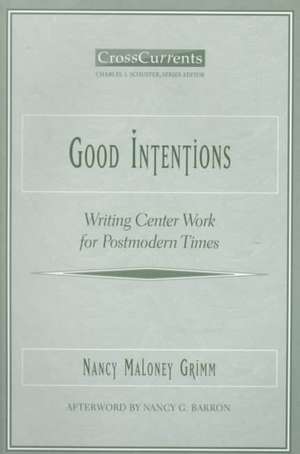Good Intentions: Writing Center Work for Postmodern Times: Crosscurrents
Autor Nancy Maloney Grimm, Grimmen Limba Engleză Paperback – 31 aug 1999 – vârsta de la 18 până la 21 ani
Writing centers cannot resolve the national confusion about literacy, but over time they can contribute to a better understanding and more democratic approaches to literacy education. But to do this, writing centers need to be more fully engaged with the paradox of literacy - the way that literacy both dominates and liberates, both demands submission and offers the promise of agency. Nancy Grimm believes that postmodern theory, which emphasizes the diversity of our society, offers the best opportunities for this engagement. Her book offers a fundamental reconsideration of writing center work - work, she maintains, that must be informed by an understanding of the cultural role of literacy education.
Because so many educational practices are based on tacit assumptions about the "normal" way to do things, Grimm argues that both the teaching and tutoring of literacy must be informed by a radical reconsideration of academic fairness. Change will depend on the willingness of comfortably situated people to open themselves to authentic listening and the possibilities of having their world views transformed by writing center students. "Good intentions alone, particularly good intentions grounded in a missionary narrative, are not enough to overcome the potentially oppressive nature of literacy education."
Grimm begins by positioning the debate about the function of the writing center in the larger cultural conflict created by postmodern conditions. She locates writing center work within the historical contradictions of literacy, then analyzes the way composition teaching regulates an academic identity. She goes on to show how postmodern theories of subjectivity offer ways to intervene in that regulation. After reconceptualizing the politics of writing center administration, Grimm ultimately argues for a conception of fairness that holds writing center workers responsible for not only granting students membership to the academic literacy club but also for changing the gates of that club when change is necessary.
"Good Intentions" is essential reading for educators involved with writing centers in any capacity - whether they be directors, researchers, professional and undergraduate staff, or simply teachers of students who use writing centers.
Preț: 314.12 lei
Nou
60.11€ • 62.92$ • 49.73£
Carte indisponibilă temporar
Specificații
ISBN-10: 0867094877
Pagini: 158
Dimensiuni: 153 x 234 x 9 mm
Greutate: 0.24 kg
Editura: Heinemann Educational Books
Seria Crosscurrents
Descriere
- Issues in Writing
Because so many educational practices are based on tacit assumptions about the "normal" way to do things, Grimm argues that both the teaching and tutoring of literacy must be informed by a radical reconsideration of academic fairness. Change will depend on the willingness of comfortably situated people to open themselves to authentic listening and the possibilities of having their world views transformed by writing center students. "Good intentions alone, particularly good intentions grounded in a missionary narrative, are not enough to overcome the potentially oppressive nature of literacy education."
Grimm begins by positioning the debate about the function of the writing center in the larger cultural conflict created by postmodern conditions. She locates writing center work within the historical contradictions of literacy, then analyzes the way composition teaching regulates an academic identity. She goes on to show how postmodern theories of subjectivity offer ways to intervene in that regulation. After reconceptualizing the politics of writing center administration, Grimm ultimately argues for a conception of fairness that holds writing center workers responsible for not only granting students membership to the academic literacy club but also for changing the gates of that club when change is necessary.
Good Intentions is essential reading for educators involved with writing centers in any capacity - whether they be directors, researchers, professional and undergraduate staff, or simply teachers of students who use writing centers.
Cuprins
Literacy Learning in Postmodern Times: Coming to Terms with a Loss of Innocence
Redesigning Academic Identity Kits
Getting Unstuck: Rearticulating the Nodal Points
Toward a Fair Writing Center Practice







